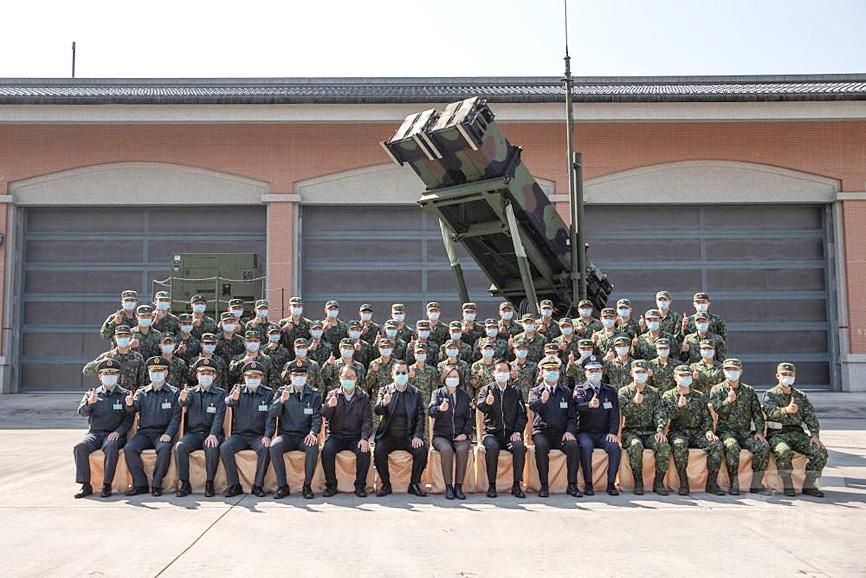Taiwan’s Patriot missiles are getting a maintenance package of NT$2.52 billion (US$84.1 million) over four-and-a-half years from the US, a notification about the deal issued by the Ministry of National Defense showed on Thursday.
The US Department of State in February approved the US Defense Security Cooperation Agency’s request to offer a maintenance package for Taiwanese Patriot PAC-2/GEM and Patriot PAC-3 missile defense systems, said a defense official who spoke on condition of anonymity.
US-made Patriot missile defense systems are designed to shoot down hostile aircraft and ballistic missiles, capabilities that experts said Taiwan urgently needs amid China’s frequent incursions into its air defense identification zone and live-fire missile tests last week.

Photo courtesy of the Military News Agency
The package includes support through the US Army International Engineering Services Program and the Field Surveillance Program, the official told the Liberty Times (sister paper of the Taipei Times).
The programs would ensure that the missiles systems are reliable, adequately supplied with parts and upgraded, they said.
These services were originally listed at US$100 million, with a program duration of five years, but the price was reduced following negotiations between Taipei and Washington, they said.
The contract was signed by a ministry-led delegation of military officers and American Institute in Taiwan officials, and took effect on July 20, they said.
Taiwan operates PAC-3s and PAC-2/GEMs — which are PAC-2s upgraded to PAC-3 performance standards. Improved PAC-3/MSEs are expected to be delivered in 2025 and 2026.
Separately, the nation’s defense budget is slated to grow 4.2 percent next year, more than the 4.09 percent the Cabinet previously said it was considering, an official familiar with the matter said.
Next year’s defense budget would be NT$15.4 billion higher than this year’s budget of NT$367.6 billion, they said, adding that the largest budget items would be personnel costs, operational costs and arms procurement.
The salaries and benefits of military service members are important issues to President Tsai Ing-wen (蔡英文), which is reflected in the budget plan prepared under the supervision of Premier Su Tseng-chang (蘇貞昌), they said.
Asked what weapons Taiwan is planning to obtain next year, the official declined to comment, citing national security implications.
Social welfare programs would remain the largest item in the government’s overall budget next year, at nearly one-quarter of the NT$2.7 trillion plan, they said.
One of the most significant changes in social welfare spending is a child-rearing subsidy increase to NT$5,000 per month, from NT$3,500 per month this year, and higher subsidies for fertility treatments, they said.
Additional reporting by Chen Yu-fu

A Ministry of Foreign Affairs official yesterday said that a delegation that visited China for an APEC meeting did not receive any kind of treatment that downgraded Taiwan’s sovereignty. Department of International Organizations Director-General Jonathan Sun (孫儉元) said that he and a group of ministry officials visited Shenzhen, China, to attend the APEC Informal Senior Officials’ Meeting last month. The trip went “smoothly and safely” for all Taiwanese delegates, as the Chinese side arranged the trip in accordance with long-standing practices, Sun said at the ministry’s weekly briefing. The Taiwanese group did not encounter any political suppression, he said. Sun made the remarks when

PREPAREDNESS: Given the difficulty of importing ammunition during wartime, the Ministry of National Defense said it would prioritize ‘coproduction’ partnerships A newly formed unit of the Marine Corps tasked with land-based security operations has recently replaced its aging, domestically produced rifles with more advanced, US-made M4A1 rifles, a source said yesterday. The unnamed source familiar with the matter said the First Security Battalion of the Marine Corps’ Air Defense and Base Guard Group has replaced its older T65K2 rifles, which have been in service since the late 1980s, with the newly received M4A1s. The source did not say exactly when the upgrade took place or how many M4A1s were issued to the battalion. The confirmation came after Chinese-language media reported

The Taiwanese passport ranked 33rd in a global listing of passports by convenience this month, rising three places from last month’s ranking, but matching its position in January last year. The Henley Passport Index, an international ranking of passports by the number of designations its holder can travel to without a visa, showed that the Taiwan passport enables holders to travel to 139 countries and territories without a visa. Singapore’s passport was ranked the most powerful with visa-free access to 192 destinations out of 227, according to the index published on Tuesday by UK-based migration investment consultancy firm Henley and Partners. Japan’s and

BROAD AGREEMENT: The two are nearing a trade deal to reduce Taiwan’s tariff to 15% and a commitment for TSMC to build five more fabs, a ‘New York Times’ report said Taiwan and the US have reached a broad consensus on a trade deal, the Executive Yuan’s Office of Trade Negotiations said yesterday, after a report said that Washington is set to reduce Taiwan’s tariff rate to 15 percent. The New York Times on Monday reported that the two nations are nearing a trade deal to reduce Taiwan’s tariff rate to 15 percent and commit Taiwan Semiconductor Manufacturing Co (TSMC, 台積電) to building at least five more facilities in the US. “The agreement, which has been under negotiation for months, is being legally scrubbed and could be announced this month,” the paper said,